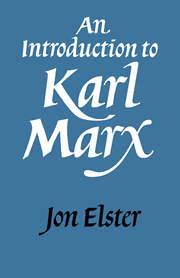Book contents
6 - Historical Materialism
Published online by Cambridge University Press: 05 January 2012
Summary
INTRODUCTION
Marx had both an empirical theory of history and a speculative philosophy of history. The former, which has come to be known as historical materialism, is a set of macrosociological generalizations about the causes of stability and change in societies. The latter, largely of Hegelian inspiration, offers a scheme for interpreting all historical events in terms of their contribution to realizing the end of history – in both senses of that term. Communism is both the goal of history and the point at which it comes to rest. Although there may be development and change in communism, it will not involve qualitative transformations of the social structure.
The speculative conception involves a division of history into three stages: preclass society, class society, and postclass society. In a different terminology, the stages are referred to as primitive unity, alienation, and unity-with-differentiation. Historical materialism is an investigation of the middle stage, the historical class societies. Not unsurprisingly, the speculative, teleological thinking impinges on the empirical part of the theory, and especially on the view that the successive sets of property relations in history are nothing but instruments for promoting technical change and thus, ultimately, for preparing communism. A major gap, or flaw, in Marx's theory of history is that he does not provide a plausible mechanism to connect the thirst for surplus labor with the development of the productive forces.
- Type
- Chapter
- Information
- An Introduction to Karl Marx , pp. 103 - 121Publisher: Cambridge University PressPrint publication year: 1986



